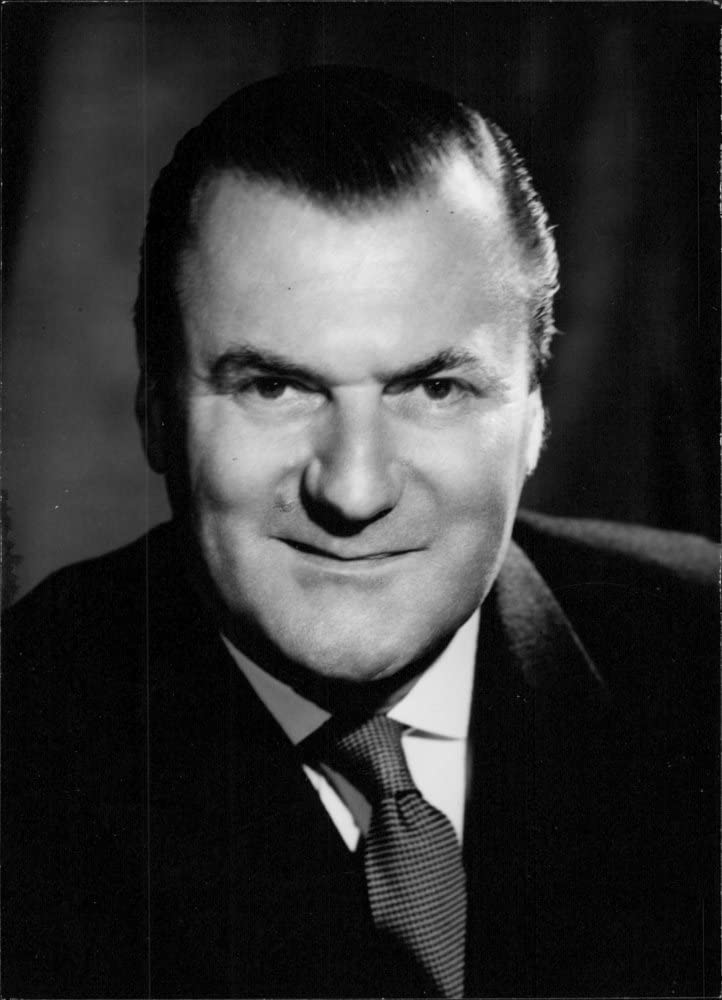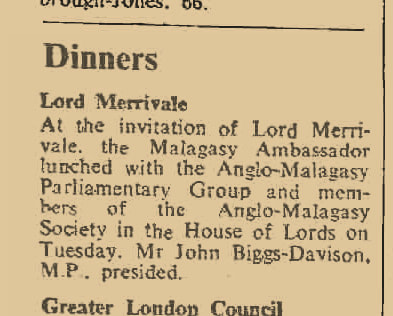The Anglo-Malagasy Society was founded on 19 October 1961. To mark its tenth anniversary in 1971, the committee published the following history of the Society:
The history of the Society began in Madagascar during the Second World War. Among the allied forces stationed there to prevent the Japanese from using the island as a submarine base were two men, Reginald Colby and Jack Duke. For them, what began as an ordinary wartime appointment grew into a close association with the land and people of Madagascar.
The wartime occupation by the allied forces must have seemed to the Malagasy people only a brief interruption of the colonial period which had begun for them before the close of the nineteenth century. But in 1960 this period came to an end and Madagascar regained the independence and the national status which it had enjoyed during the nineteenth century.
For our two friends, the renewal of the national identity of Madagascar presented, quite independently, an opportunity not to be missed. The formal relationship between the Malagasy Republic and the United Kingdom was enshrined in the protocols of diplomatic recognition and the exchange of representatives; but it seemed that more was needed and that the official connections ought to be matched by the creation of a private organisation designed to develop unofficial relations between the two countries. A visit to Madagascar by Reginald Colby in 1960 established that these wishes were shared in Antananarivo, where the association between the Malagasy Government and both official and private British representatives was still remembered. The upshot was the foundation in London on 19th October 1961 of the Anglo-Malagasy. Society. Jack Duke, now the 3rd Baron Merrivale, was elected Chairman and Reginald Colby undertook the Secretaryship. Lord Merrivale was able to pay his first return visit to the great island in January 1962. |
British contacts with Madagascar in the early nineteenth century were undertaken in the first instance by military or civil emissaries of the Governor of Mauritius after the cession of Mauritius by France in 1815. But from 1820 onwards Christian missionaries began to play an increasingly important role. The missionary element remains a powerful influence in the religious life of the country; and the Society therefore contains among its membership representatives of many religions and missionary organisations, including the London Missionary Society (now renamed the Congregational Council for World Mission) and the Society of Friends.
Another major element in the Society is that of trade. It could perhaps be said that trade between Madagascar and Britain began three hundred and seventy years ago, when ships of the East India Company first started calling at Malagasy ports to barter for provisions; and it later acquired an unusual dimension when English pirates operating in the Indian Ocean used Madagascar as their base and disposed of their booty there. But contemporary trade, if less romantic, is more significant in economic terms; and the export, for instance, of butter beans to Britain from the south-west of Madagascar has a history which goes back more than fifty years and is still an important economic factor in that part of the country. The private encouragement of an expanding Anglo-Malagasy trade is thus an objective of the Society. It is in the light of the existence of these two major elements of Anglo-Malagasy relations that both missionary and trade representatives are to be found on the Society's executive committee.
The Society's policy of arranging contacts with visitors from Madagascar is being steadily pursued. We have entertained not only ministers, senior officials and other dignitaries from Madagascar but also numbers of Malagasy students who have come to Britain to learn English, All Malagasy students in the UK and British students with a genuine interest in Madagascar have the right of free membership of the Society. We have also heard reports from British visitors to Madagascar in a variety of fields.
Ever since it was founded the Society has received warm and generous support from the Malagasy Embassy in London; and we are deeply grateful for the personal interest in the Society and the active encouragement of its objectives shown by successive Ambassadors. We thought it right to recognise this active support by inviting a senior member of the Ambassador's staff to join the Committee. M Henri Razafindratovo was the first representative, and we were grateful for his counsel. We now welcome Raymond Raoelina in his place.
Reginald Colby died in 1969, secure in the knowledge of the flourishing condition of the Society which he had helped to found. During his illness he had been succeeded as Secretary by Mrs Margaret Burke of the Society of Friends. Mr Frank Horsfall took her place as Treasurer. In the sane year the Society turned its attention towards the needs of the unfortunate, As the result of an approach by the Chairman, Oxfam agreed to make a grant of £7,000 for capital construction and bursaries for a Home for Delinquent Boys. Secondly, Lord Merrivale paid a visit to Madagascar in September 1969 in the course of which he was able to review the special problem of leprosy. There are about 30,000 registered lepers in Madagascar and the total may be twice that number. Lord Merrivale was able to see a number of treatment centres; and as the result of his report the Society organised an appeal. £455 resulted and the Society made an additional grant of £50; the total sum has been used for the benefit of lepers at Maevetanana.
The Chairman’s visit was also designed to promote support for the formation of an Anglo-Malagasy Parliamentary Group under the Inter-Parliamentary Union. He was able to secure the agreement of the Presidents of the Malagasy National Assembly and Senate; and after consultation with members of the UK Parliament the Group was formally established in London on 19th November 1969, Finally, a sister Society was re-established in Antananarivo in November 1969 under the Chairmanship of M Albert Ramangasoavina, now Minister of Health.
|
The Society began publishing a regular newsletter in 1977, and continues to do so. The remaining history of the Society from the 1970s till the present day can thus be explored in detail via our Newsletter archive. For a more recent history of speakers and events hosted by the Society, see the Past events page.


